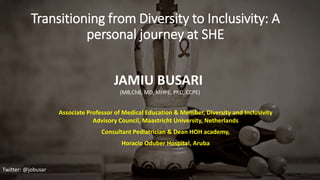She Academy 2021_transitioning from Diversity to inclusivity in higher education
- 1. Transitioning from Diversity to Inclusivity: A personal journey at SHE Associate Professor of Medical Education & Member, Diversity and Inclusivity Advisory Council, Maastricht University, Netherlands Consultant Pediatrician & Dean HOH academy, Horacio Oduber Hospital, Aruba Twitter: @jobusar JAMIU BUSARI (MB,ChB, MD, MHPE, PhD, CCPE)
- 2. DISCLOSURE STATEMENT No conflicts of interest
- 7. Bullock et al., 2020. Acad Med
- 8. Busari J.O., 2019. BMJ Leader
- 9. Systemic discrimination in medical education and practice Freeman et al., Academic Medicine, Vol. 91, No. 7 / July 2016 1. Inadequate institutional support & resources 2. Limited personal resources & social/family conflict 3. Lack of access to information, mentoring, & advising 4. Societal barriers
- 10. Microagression An Asian-American student is complimented by a professor for speaking perfect English, but it's actually his first language A black man notices that a white woman flinches and clutches her bag as she sees him in the elevator she's about to enter, and is painfully reminded of racial stereotypes A woman speaks up in an important meeting, but she can barely get a word in without being interrupted by her male colleagues
- 11. Diversity, Visibility & Implicit Bias
- 12. The Elephant in the room
- 14. The Coin Model of Privilege Nixon, S.A. The coin model of privilege and critical allyship: implications for health. BMC Public Health 19, 1637 (2019). https://doi.org/10.1186/s12889-019-7884-9
- 15. Privilege
- 16. ENTITLEMENT ŌĆó A provision made in accordance with a legal framework of a society. Typically, based on concepts of principle which are themselves based in concepts of social equality or enfranchisement ŌĆō Wikipedia.org ŌĆó The fact of having a right to something. ŌĆó The belief that one is inherently deserving of privileges or special treatment.
- 17. Intersection of Allyship, Privilege and Entitlement PRIVILEGE ALLYSHIP ENTITLEMENT [+++] [- - -] JO. Busari/2021
- 18. Inclusive Leadership Le Blanc et al., 2020. GMS Journal of Med Educ
- 19. 1. EQUALITY is giving people the same things 2. EQUITY is fairness in every situation Inclusivity
- 21. Bystander Intervention Impact Paluck (2011): impact of bystander behavior across multiple levels is evident in a study focused on bystander action in schools, in relation to religion, race, and homosexuality Czopp et al. (2006): argue that even if bystander action only changes public behavior, this nonetheless ŌĆ£may have beneficial consequences by creating norms of egalitarianism and instigating self- regulatory processesŌĆØ Paluck, Elizabeth Levy. "Peer pressure against prejudice: A high school field experiment examining social network change." Journal of Experimental Social Psychology 47.2 (2011): 350-358. Czopp, Alexander M., Margo J. Monteith, and Aimee Y. Mark. "Standing up for a change: Reducing bias through interpersonal confrontation." Journal of personality and social psychology 90.5 (2006): 784. Speak Up!
- 22. ALLYSHIP
- 23. ALLYSHIP Emphasizing social justice, inclusion, and human rights by members of an ingroup, to advance the interests of an oppressed or marginalized outgroup.
- 24. BE AN ALLYŌĆ”ŌĆ”
- 25. "In the end, we will remember not the words of our enemies, but the silence of our friends." Martin Luther King 25
- 26. Recommendations 1. Mandatory unconscious bias and anti-discrimination trainings for all staff 2. Managers/leaders must have demonstrable anti-racism and inclusivity competencies 3. Mandatory unconscious bias trainings for selection committee members 4. Inclusive vacancy text checks 5. Redefine the concept of talent to promote inclusion and equitability 6. Fixed inclusion quota for underrepresented minorities (women/colored/non EU) in academic/administrative/leadership positions 7. Demonstrable anti-racism and inclusivity competencies should be mandatory criteria for promotionŌĆŗ 8. Use of increased and widespread inclusive language 9. Calling out inappropriate behaviour 10. Recognizing privilege and using it to amplify underrepresented voices (Allyship)
Editor's Notes
- #24: Allyship┬Āis part of the anti-oppression or anti-racist conversation, which puts into use social justice theories and ideals.

















![Intersection of Allyship, Privilege and
Entitlement
PRIVILEGE
ALLYSHIP
ENTITLEMENT
[+++]
[- - -]
JO. Busari/2021](https://image.slidesharecdn.com/sheacademy-210415190305/85/She-Academy-2021_transitioning-from-Diversity-to-inclusivity-in-higher-education-17-320.jpg)








